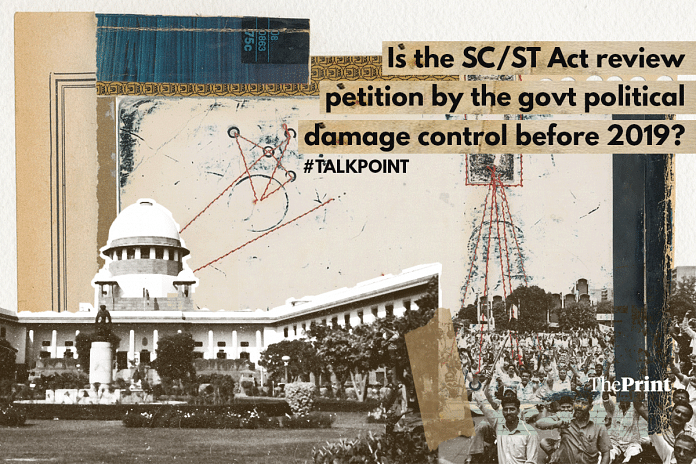After barring immediate arrests in cases filed under the SC/ST Act, a two-judge bench of the Supreme Court on 20 March flagged its “rampant misuse”, and said the law was never meant to become “an instrument to blackmail or to wreak personal vengeance.” The bench ordered a seven-day inquiry before a case is filed or arrest made, and government sanction before arrest of public officials.
After opposition from its own MPs, like Ram Vilas Paswan and Savitri Bai Phule, the government has filed a review petition Monday.
ThePrint asks: Is the SC/ST Act review petition by the govt political damage control before 2019?
The BJP government is scared that it will be deserted by its Dalit MPs
 Rita Kothari
Rita Kothari
Professor (English), Ashoka University (views are personal)
The motivation for the review petition is less interesting than the government’s approach towards ensuring social justice for Dalits. It is less intriguing to decipher the symbolic message they are sending — about legal support for Dalits — than it is to explore whether they have been able to ensure a life of dignity and self-respect for the community.
Automatic arrests have always instilled a kind of fear in perpetrators of atrocities against Dalits. The prompt legal justice system provides a safeguard in that sense. But according to a report by some students from a college in Ahmedabad, out of 100 cases of Dalit atrocities, barely five resulted in FIRs. Even before the legal system came into play, the complainants were told that they needed two upper caste witnesses. Imagine the intimidation the victim feels when they have to approach someone from the caste that they are reporting against.
The gap between social justice and legal justice is still glaringly vast.
Yes, partly the government is scared that it will be deserted by its Dalit MPs. Or that it needs to ‘balance’ its image in one context, but turn a blind eye to ground-level developments. It is disrupting its own homogeneity by first supporting a ruling and then pleading against it.
But beyond the symbolism, where this review petition may seem supportive, lies the bigger question of bringing already existing perpetrators of such crimes to justice. The government needs to address that first. Those gestures, unfortunately, do not garner huge publicity.
Concerns about the SC/ST Act were not about its misuse but about arbitrary arrests
 Amarendra Sharan
Amarendra Sharan
Senior advocate, Supreme Court
The power of arbitrary arrests in cases of commercial discord, matrimonial discord, or SC/ST Act has been reviewed by the court. There are a number of conditions that must be met according to India’s criminal procedure code if an offence that entails a sentence of less than seven years is committed.
Firstly, credible information that explains the urgency of the arrest must be provided. Secondly, arrest is avoided unless the person is likely to interfere in the case, or run away, or repeat the offence. Thirdly, if the person is not likely to cooperate with the investigation, he should be arrested. The court requested this to be applicable to all cases.
The SC/ST Act’s unfairness came to prominence when police requested sanction from the senior authority to arrest a person charged under the SC/ST Act. When the senior officer said that what had happened was a routine activity in any office, he was charged as well. The report was confidential, not public. How was it offensive? By this logic, even the judge should be charged under the same Act.
Powers of arbitrary arrest by police are required to be regulated by judicial direction. The strict interpretation of law is necessary for protecting the civil rights of citizens.
It is a canard that the judgment dilutes the Act. All it does is prevent arbitrary arrest.
The government had earlier supported it in court and taken a balanced view. The additional solicitor general supported the dilution of the same. Now they want to rethink it. The submission before the court was legal; if political colour is being given to it, I cannot answer that.
The government definitely does not want to take the risk of alienating Dalits before 2019 elections
 Anurag Bhaskar
Anurag Bhaskar
Legal commentator
Keeping with his efforts to appropriate Dr B.R. Ambedkar’s legacy and woo Dalit voters, the Prime Minister comes forward whenever his party or the government is targeted for neglecting the community. After the suicide of Dalit student Rohith Vemula, which led to nationwide protests, the Prime Minister cried at the convocation ceremony of a central university named after B.R. Ambedkar in Lucknow. Jignesh Mevani led protests against the assault on Dalit youths by alleged cow vigilantes in Gujarat, following which the Prime Minister openly condemned cow vigilantes, calling them “anti-social elements”.
This time, the union government is under criticism for not being able to defend successfully before a two-judge bench of the Supreme Court, the provisions of the Scheduled Castes and Scheduled Tribes (Prevention of Atrocities) Act, 1989. The Supreme Court has now allowed the provision of anticipatory bail and restricted the scope of FIR registrations and possible arrests for offences under the Act.
The stand of the Supreme Court has not gone down well with the Dalit community as they perceive the judgment to be a threat to their social security.
The issue of protection against social oppression is a question of existence for Dalits.
The judgment is set to have negative repercussions on the working of the Act, which is already inadequately implemented on the ground. To protest against this, Dalit activists and organisations called a Bharat bandh today, getting support from elected Dalit leaders across party lines.
The protests and criticism against the ineffective stand of the union government have forced it to file a review petition before the Supreme Court. Clearly, the union government does not want to be perceived and portrayed as being unconcerned about one of most vital issues for Dalits. The government definitely does not want to take the risk of alienating Dalits before the Lok Sabha elections in 2019.
The review petition is in no way politically motivated, there will be no political benefit accruing from it
 Raghav Pandey
Raghav Pandey
Research fellow with the department of humanities and social sciences, IIT-Bombay
In no way can the Centre’s review petition be termed politically motivated.
First of all, the government is not accountable for any verdict passed by the apex court and, hence, the question of damage control on part of the government doesn’t arise.
More importantly, the verdict of the Supreme Court is itself very problematic. The court, in its wisdom, decided to impose procedural safeguards for cases against government servants, and their arrest can now only happen after the government’s sanction. Though such requirements are also found in other statutes like the Prevention of Corruption Act, this can’t be imported into the operation of a special law like the SC/ST Act unilaterally by the judiciary.
Firstly, the legislature is the appropriate institution to take such a measure, if at all. However, judicial overreach has become the norm in contemporary Indian jurisprudence. Secondly, the SC/ST Act is a special law that has been enacted to protect the interests of a historically marginalised segment of our society and its dilution by a two-judge bench alone is simply unacceptable. This law has acted as a tool against oppression in the hands of the people who need it the most. To curtail its operation against a segment of the society (government servants), which is very likely to violate this law, makes little sense.
The review petition of the Centre is in no way politically motivated, because I don’t see a political benefit accruing from it. Instead, it is legally expedient for the court to reverse the verdict.
The government could have done a better job of persuading the Supreme Court not to touch the SC-ST Act
 Maneesh Chhibber
Maneesh Chhibber
Editor (investigations & special projects)
With just about a year to go before the country votes to elect a new government, the Supreme Court judgment putting an end to immediate arrests in complaints filed under the Scheduled Castes and the Scheduled Tribes (Prevention of Atrocities) Act couldn’t have come at a worse time.
But the Narendra Modi government has only itself to blame for the mess that it finds itself in, something that could turn messier.
While additional solicitor general Maninder Singh, arguing for the union of India, told the SC bench that there was “no occasion to go into the issue of validity of provisions of the Act” and that “in genuine cases anticipatory bail can be granted”, there are many who feel that the government could have done a better job of persuading the SC not to touch the Act.
Now that the opposition has seen a possible breach in Narendra Modi’s citadel via the SC judgment, being dubbed anti-Dalit by most parties, including, not surprisingly, the BJP’s own allies and MPs, the government has been forced to act.
But for a government that prides itself on its political savvy, the decision to file a review petition, especially after so many days of the SC judgment and on a day when several parts of the country are seeing bandhs by Dalit organisations and opposition parties, will be viewed as an act under duress rather than voluntary.
Coming in the backdrop of growing disenchantment, fuelled by a gleeful opposition, this faux pas could affect Modi’s re-election plans.
But Prime Minister Narendra Modi is a master strategist, who will certainly be mulling steps to counter the backlash and how to win back the Dalit population. His next step will be worth waiting for.
Compiled by Deeksha Bhardwaj, Journalist at ThePrint




No fair minded person should grudge reasonable safeguards in place of automatic arrest, which is all that the apex court has mandated. The anger that has poured out onto the streets of several north Indian states suggests there is hurt and disappointment in the commnity. If 15% Dalits get added to almost 15% Muslims, that will become a formidable electoral bloc.